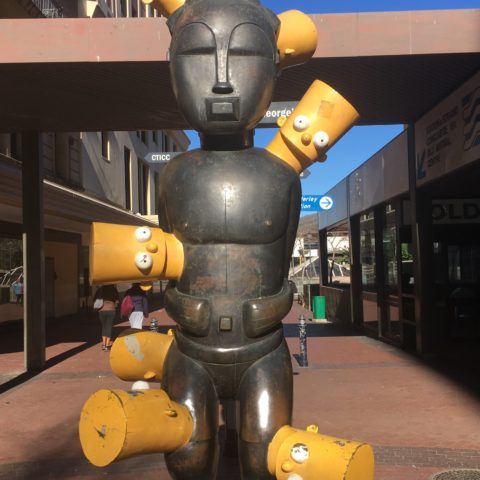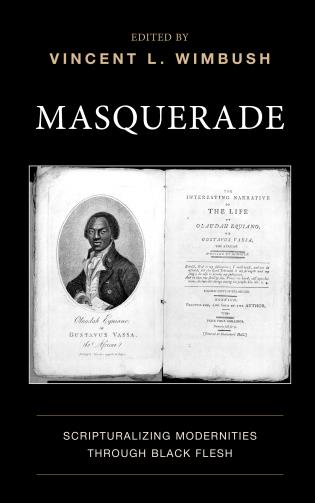
Reflections from ISS@Charlotte – Lalruatkima
March 18, 2017
Third Annual Meeting – February 22-24, 2018 – Fort Worth, TX
September 24, 2017ISS in South Africa

ISS in South Africa
The Institute for Signifying Scriptures was represented at the annual meeting of the Consortium of Humanities  Centers and Institutes (CHCI), which convened in August 2017 at the Castle of Good Hope in Cape Town, South Africa. About 300 folks from a number of humanities centers were in attendance for a three-day program of lectures, panels, and artistic performances. Among the highlights were the opening plenary lecture by Isaac Julien, an Afro-British installation artist and filmmaker, who showed clips of his fascinating recent work, “I dream a world” Looking for Langston”; a remarkable performance of Kafka’s Ape by Tony Bonani Miyambo at the Gugu S’thebe Arts Center, and Johannesburg artist William Kentridge’s excellent closing plenary lecture, “If the Good Doctor…A Defense of the Less Good Idea.” In between, we also heard from Homi Bhabha and Gayatri Spivak, among others. The theme of the conference, “The Humanities Improvised” intended to aid participants exploring “the multiple ways in which improvisation has enabled and facilitated the study of the humanities, not least in times of great social upheaval.” (CHCI website).
Centers and Institutes (CHCI), which convened in August 2017 at the Castle of Good Hope in Cape Town, South Africa. About 300 folks from a number of humanities centers were in attendance for a three-day program of lectures, panels, and artistic performances. Among the highlights were the opening plenary lecture by Isaac Julien, an Afro-British installation artist and filmmaker, who showed clips of his fascinating recent work, “I dream a world” Looking for Langston”; a remarkable performance of Kafka’s Ape by Tony Bonani Miyambo at the Gugu S’thebe Arts Center, and Johannesburg artist William Kentridge’s excellent closing plenary lecture, “If the Good Doctor…A Defense of the Less Good Idea.” In between, we also heard from Homi Bhabha and Gayatri Spivak, among others. The theme of the conference, “The Humanities Improvised” intended to aid participants exploring “the multiple ways in which improvisation has enabled and facilitated the study of the humanities, not least in times of great social upheaval.” (CHCI website).
 Speaking of improvisation, the conference raised questions about whether and why to continue ISS’s membership in an organization largely represented by relatively large and well-funded centers housed in inherently conservative academic and institutional settings. The ISS is nothing if not improvisatory, seeking out new modes of instrumentality, emplacement and transmission. As a lean and mean independent operator, ISS functions quite differently from those mostly represented by CHCI. That said, the conference also provided many moments of affirmation about the centrality of the kind of research, questions, and projects ISS supports. Considered within the overlapping and shifting claims of decolonization, neocolonialism, postcolonialism, postracialism, globalization and neoliberalism that characterize life in the twenty-first century, reorientation regarding scriptures is no longer optional.
Speaking of improvisation, the conference raised questions about whether and why to continue ISS’s membership in an organization largely represented by relatively large and well-funded centers housed in inherently conservative academic and institutional settings. The ISS is nothing if not improvisatory, seeking out new modes of instrumentality, emplacement and transmission. As a lean and mean independent operator, ISS functions quite differently from those mostly represented by CHCI. That said, the conference also provided many moments of affirmation about the centrality of the kind of research, questions, and projects ISS supports. Considered within the overlapping and shifting claims of decolonization, neocolonialism, postcolonialism, postracialism, globalization and neoliberalism that characterize life in the twenty-first century, reorientation regarding scriptures is no longer optional.
 In tandem with the conference, Wimbush was invited to lecture at the University of the Western Cape. He introduced colleagues there to the work of the ISS, and invited their collaboration and participation with the following: “The challenge I direct to you is a different orientation to interpretation itself, using scriptures to think with, including the concept of scripturalization as touchstone and baseline for a radically different project in understanding of conscientization and relations of power. This project I call signifying (on) scriptures. The matrix and safe space for it is the Institute for Signifying Scriptures.”
In tandem with the conference, Wimbush was invited to lecture at the University of the Western Cape. He introduced colleagues there to the work of the ISS, and invited their collaboration and participation with the following: “The challenge I direct to you is a different orientation to interpretation itself, using scriptures to think with, including the concept of scripturalization as touchstone and baseline for a radically different project in understanding of conscientization and relations of power. This project I call signifying (on) scriptures. The matrix and safe space for it is the Institute for Signifying Scriptures.”
Getting to know colleagues over homemade briyani (or biryani: there was debate!) was most enjoyable. We look forward to what our new partners in South Africa will bring to our ever-expanding conversation.
— Rosamond Rodman



